Florida Sea Grant (FSG) welcomes a new cohort of undergraduates selected to join the 2025 FSG Undergraduate Research Internship Program. Mentored by FSG affiliated faculty, our interns will be participating in research focused on Sustainable Fisheries & Aquaculture, Healthy Coastal Ecosystems, and Resilient Coastal Economies.
“Undergraduate research serves as a vital foundation for early career scientists, offering hands-on experience in marine and coastal sciences,” says Dr. Sherry Larkin, Director of the Florida Sea Grant College Program. “These opportunities not only introduce students to the impactful work of Florida Sea Grant but also help lay the groundwork for long-term careers in the field. In turn, interns bring fresh perspectives and energy that enhance our program’s mission and broaden its reach. Their collaboration with faculty also fosters meaningful mentorship, enriching the research process and cultivating a dynamic learning environment for all involved.”
To learn more about our past interns and projects, see our 2022, 2023, and 2024 cohorts.
Meet the 2025 Internship Cohort:
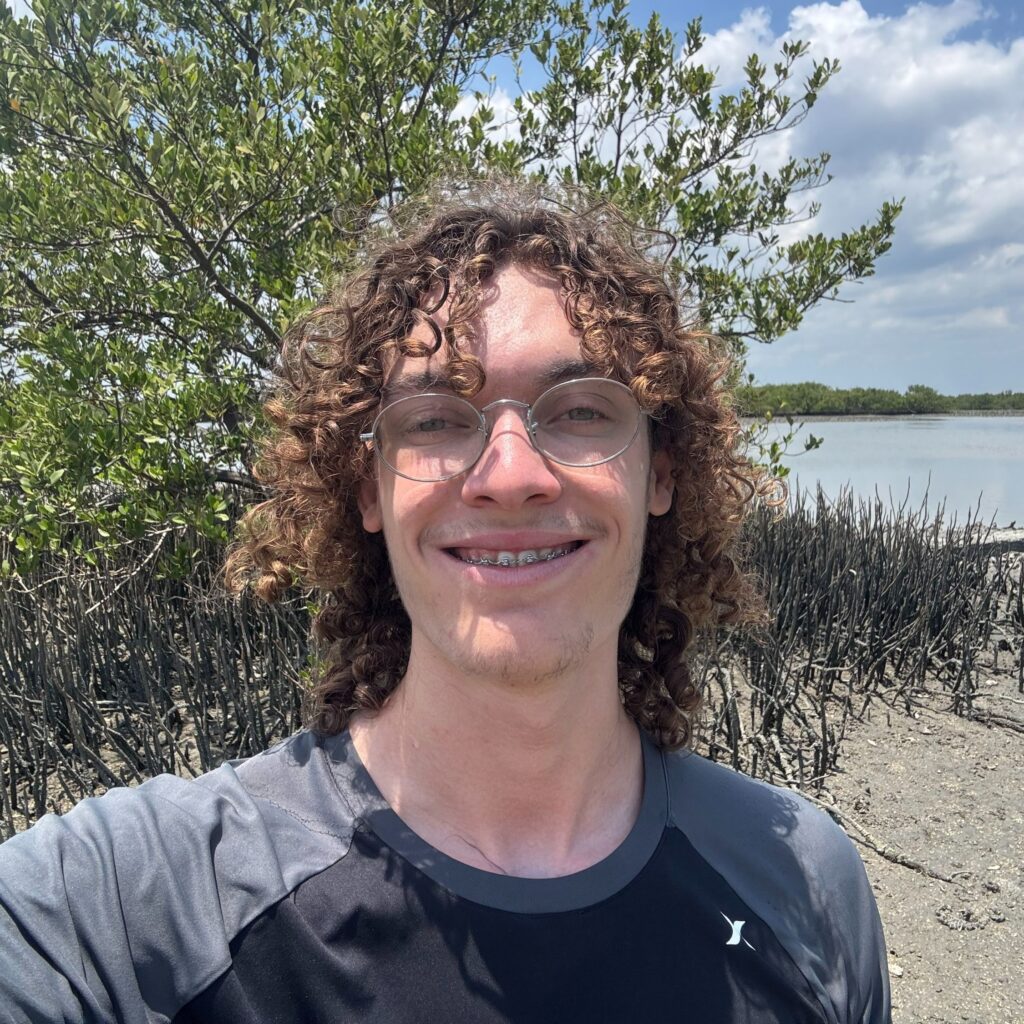
Hunter James
Florida International University, 2028
Faculty Mentor: Jose Rolando, Microbiology & Cell Science (Ft. Lauderdale REC)
Research Project: Environmental Stressors and Plant-Microbe Interactions in the Marsh-Mangrove Ecotone: Mechanisms and Implications for Ecosystem Restoration
Hunter is a student at Florida International University majoring in Electrical Engineering. He is working with Dr. Jose Rolando, an Assistant Professor in Microbiology and Cell Science in the Rolando Lab located at the UF/IFAS Fort Lauderdale Research and Education Center. Their summer research project investigates how environmental stressors like salinity and sulfide affect marsh and mangrove plants, as well as their root-associated microbes. The study takes place in both the field and under controlled greenhouse conditions. Findings from this project will enhance predictability of wetland resilience and guide restoration efforts in response to climate-driven impacts along Florida’s coast. Hunter is particularly passionate about Florida native vanilla orchards, native plants, and exploring their habitats in Florida.
What is Hunter most looking forward to?
“I am looking forward to meeting new people and learning more about the environment.”
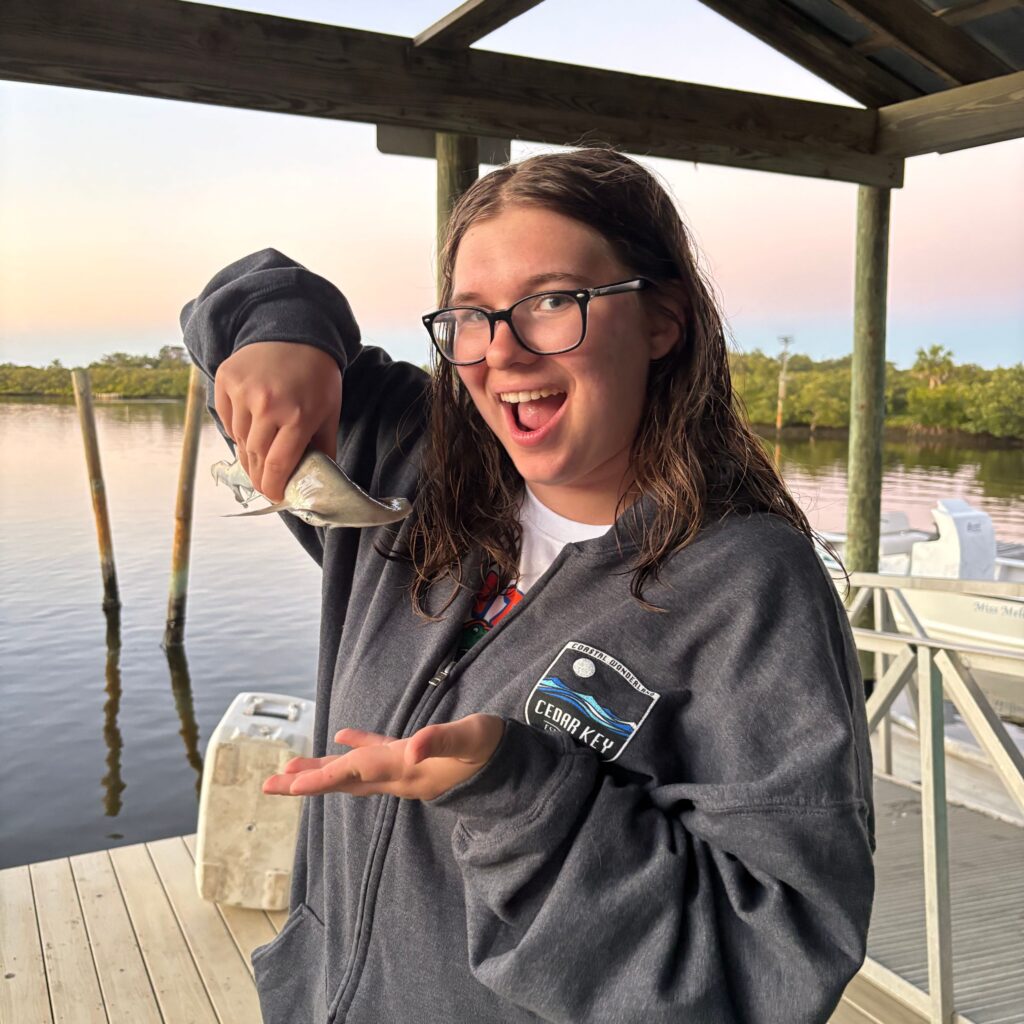
Madison “Madi” Konash
University of Florida, 2028
Faculty Mentor: Marc Hensel, UF/IFAS Soil, Water & Ecosystem Science (NCBS)
Research Project: Predator Effects on Oyster Growth Across Restoration Contexts
Madi is an undergraduate at the University of Florida majoring in Environmental Science. Madi is partnering with Dr. Marc Hensel, a Research Assistant Professor in Coastal Ecology at the Nature Coast Biological Station in Cedar Key, FL. This summer, they will be working together to understand how predator-prey interactions influence oyster growth, survival, and ecosystem function in both restored and natural reef settings near Cedar Key. Field experiments will test reef replacement, tidal elevation, and predator impacts to help guide more effective, ecologically informed oyster restoration strategies. As a former UF Gulf Scholar, Madi fell in love with fieldwork while completing an independent project on the interactions between marsh periwinkle snails and marsh cordgrass.
What is Madi most looking forward to?
“I am looking forward to gaining hands-on knowledge and experience while working in the field. I have already learned so much about Gulf ecosystems, so I am excited to be able to apply that knowledge in real-world settings, contribute to ongoing environmental research, and further develop my skills as an ecologist!”
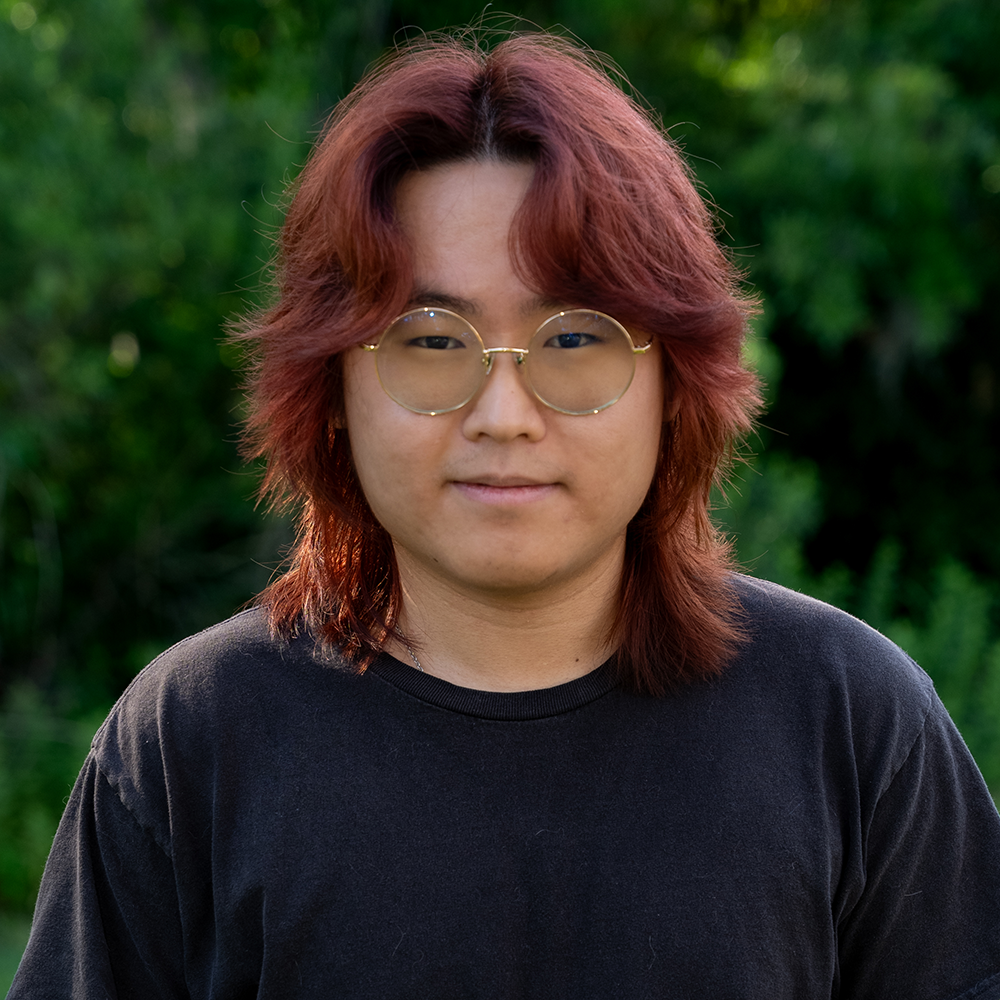
SeungHyun Lee
University of Florida, 2026
Faculty Mentor: Andrew Ropicki, UF/IFAS Food & Resource Economics
Research Project: Individual Transferable Quota as an Investment: A Case Study of the Gulf of America Red Snapper and Grouper-Tilefish IFQ Programs
SeungHyun is a student at the University of Florida majoring in Food and Resource Economics with a focus on marketing and management. SeungHyun is working with faculty mentor, Dr. Andrew Ropicki, an Assistant Professor specializing in marine resource economics. Their research project focuses on evaluating the performance and valuation of fishing quota as an investment asset within the Gulf of America Red Snapper and Grouper-Tilefish IFQ Programs. Using financial models and portfolio theory, the project also aims to develop an online decision support tool to help fishers assess quota value based on future expectations of the fishery. SeungHyun is interested in how economic principles can be applied to real world issues in food systems and agribusiness and has a strong interest in marine life.
What is SeungHyun most looking forward to?
“As I begin my internship, I’m most looking forward to gaining practical experience and seeing how the concepts I’ve learned in my coursework apply in a real-world setting. I’m also hoping to develop my professional skills, work with experienced mentors, and better understand what career path might be the best fit for me in the future.”
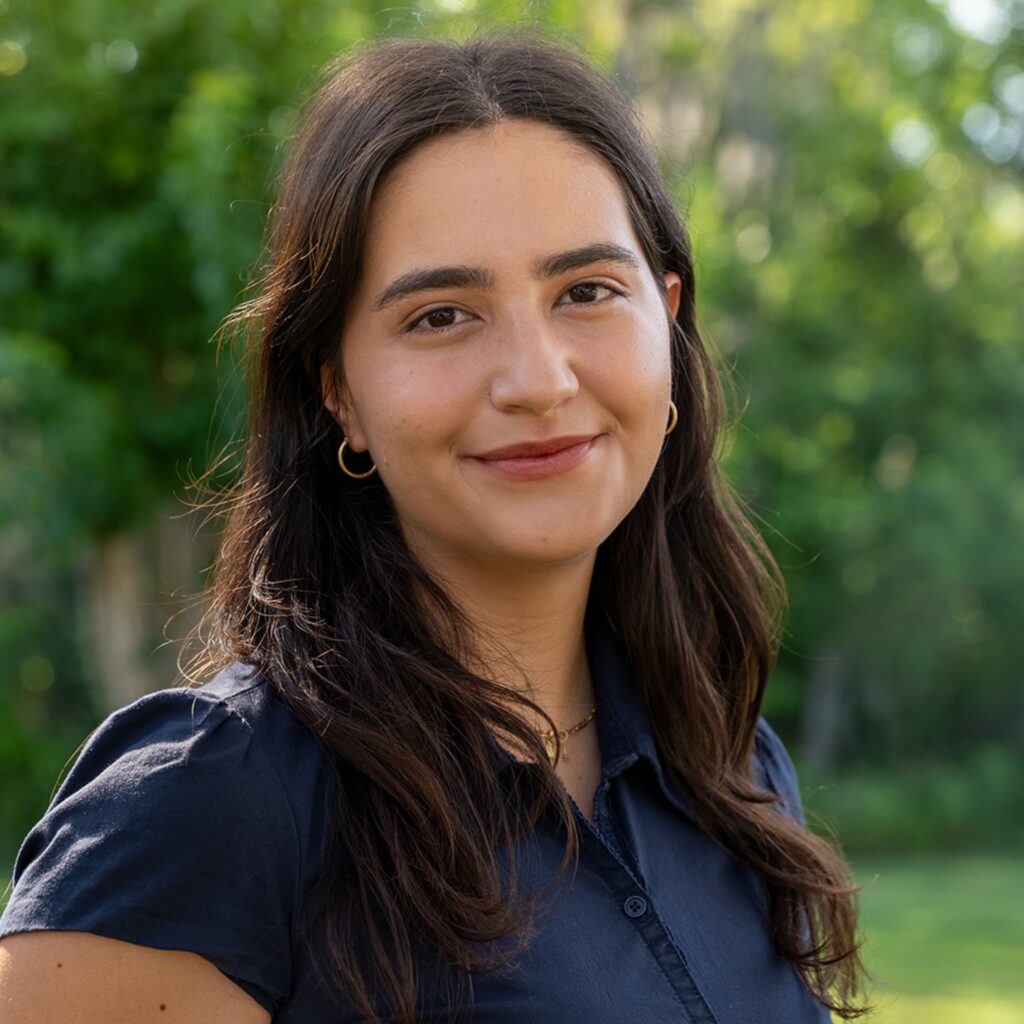
Maylet Perez
University of Florida, 2026
Faculty Mentor: Anna Braswell, UF/IFAS School of Forest, Fisheries & Geomatics Sciences
Research Project: Monitoring Mature Oyster Restoration Projects in the Indian River Lagoon and St. Lucie Estuary for Practitioner Application
Maylet is a Natural Resource Conservation major at the University of Florida with a focus in hydrology and geography. She is working alongside faculty mentor, Dr. Anna Braswell, an Assistant Professor in the Coastal Ecosystems and Watersheds Lab at UF. Their research project focuses on evaluating ecosystem service recovery in restored oyster reefs of varying ages in the Indian River Lagoon and St. Lucie Estuary. By developing a Quick Assessment Monitoring Guide, the project aims to support long-term monitoring, improve restoration outcomes, and promote collaboration among coastal managers and practitioners. This also includes work on FSG’s Florida Microplastics Awareness project. Maylet brings with her to this project a background in urban water management and GIS research. She is interested in exploring coastal systems and how they interact with patterns of urbanization and climate impacts.
What is Maylet most looking forward to?
“I am looking forward to conducting fieldwork in the Indian River Lagoon and St. Lucie Estuary this summer, learning how to build and program wave pressure gauges, and develop outreach materials for Florida Microplastics Awareness!”
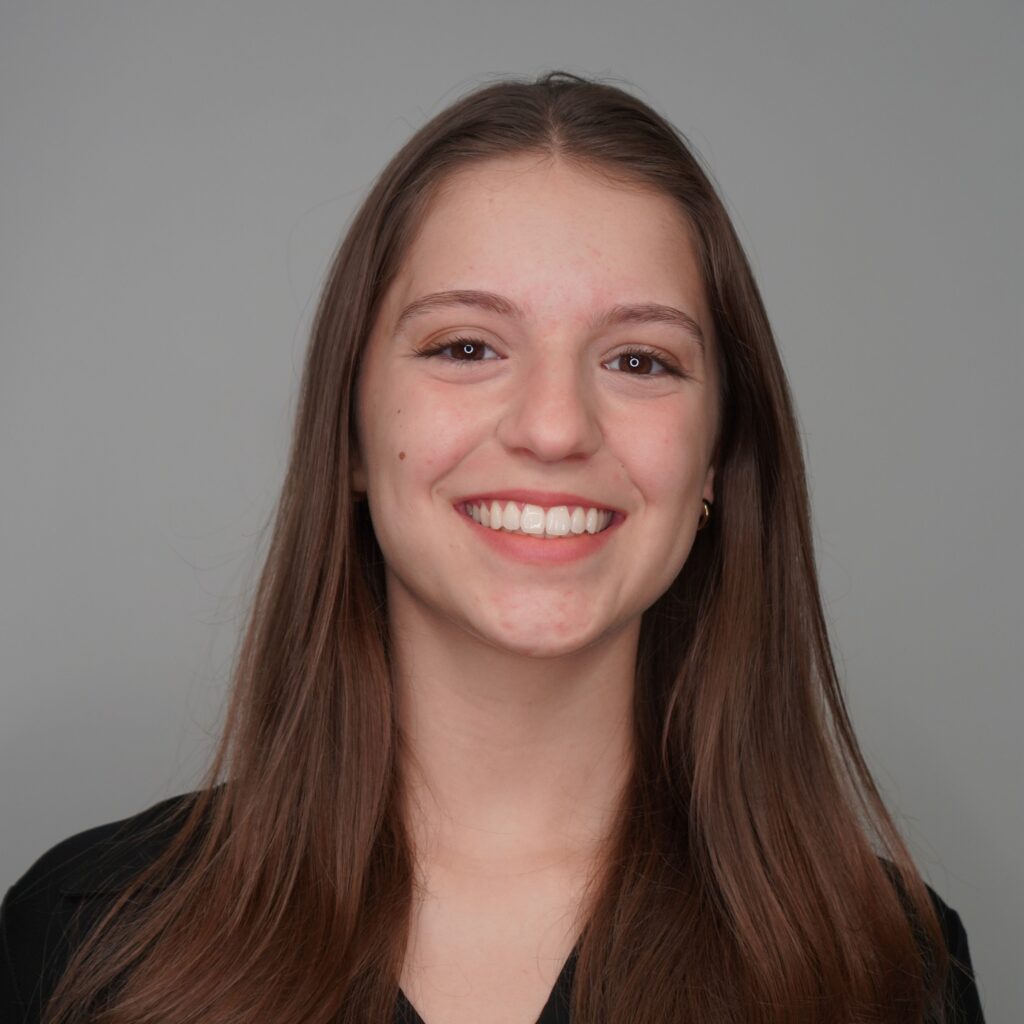
Ana Lucia Rodriguez-Valdes
University of Florida, 2026
Faculty Mentor: Carla Brisotto, UF School of Architecture – FIBER
Research Project: Cultural Identity Assessment Tool for Resilient Small Coastal Towns on the Florida Coast
Ana Lucia is an Architecture major at the University of Florida with interests focused on urban planning in coastal cities, sustainability, and healthcare education. She is working with faculty mentor, Dr. Carla Brisotto of the UF School of Architecture and Assistant Director of the Florida Institute for Built Environment Resilience (FIBER). Their research project focuses on developing a GIS-based assessment tool that helps small Florida coastal towns identify significant locations within their towns and understand how residents balance community identity with resilience needs. By mapping areas of community value and climate vulnerability, the tool aims to guide locally-supported resilience planning that preserves the unique character of these communities.
Ana Lucia hopes to work toward improving Florida’s East Coast habitats and enhance people’s quality of life through sustainability architecture.
What is Ana Lucia most looking forward to?
“I’m looking forward to contributing to a project that could have very real applications and benefits to towns in need in Florida. Since this project is tailored to rural communities and there’s an opportunity to work with them directly, the work can help make direct impacts on people’s lives. I’m also very excited to learn some technical skills and software that are extremely useful and can be applied to many different projects.”
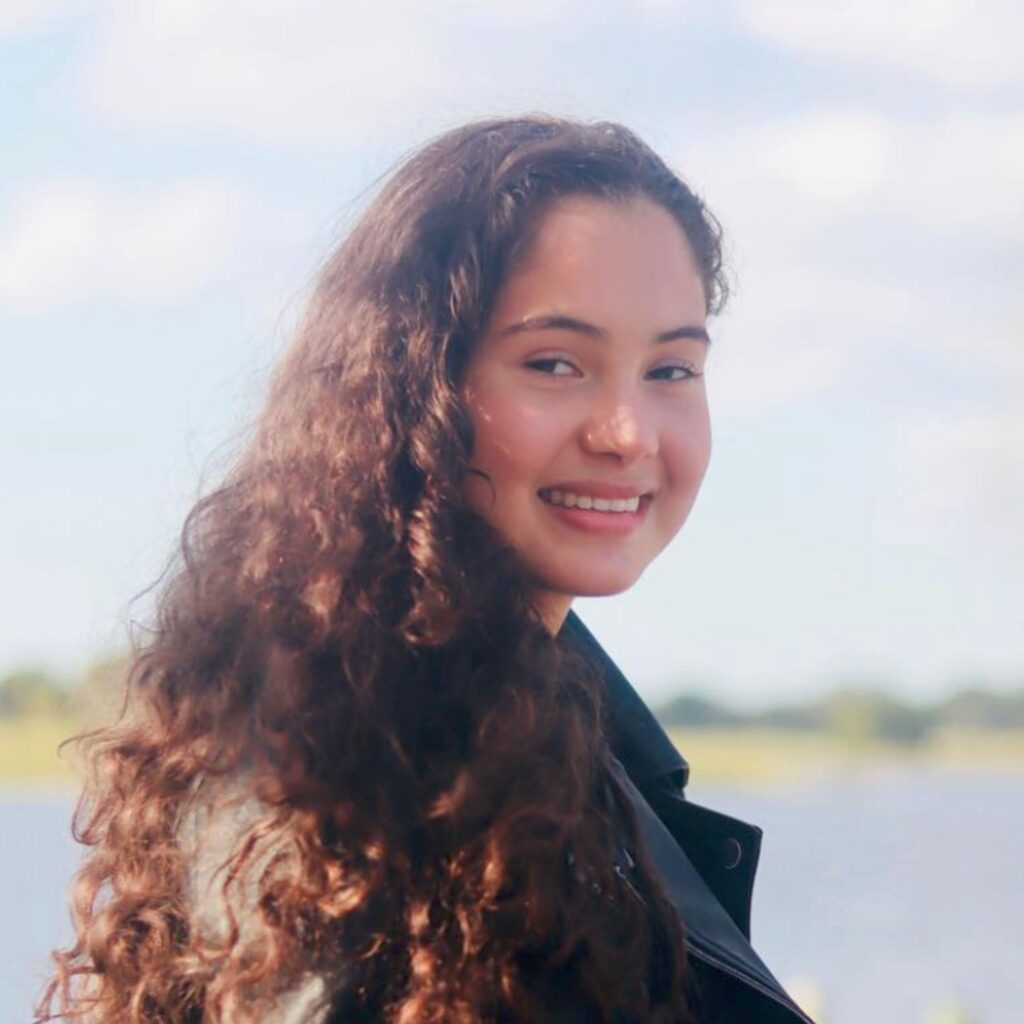
Kelani Saez
University of Florida, 2027
Faculty Mentor: Naim Montazeri, UF/IFAS Food Science & Human Nutrition
Research Project: Assessing thermal resilience of norovirus in oyster tissues
Kelani is a Food Science major at the University of Florida with a strong interest in food safety and public help. She and her mentor, Dr. Naim Montazeri, an Assistant Professor in the UF/IFAS Food Science & Human Nutrition Department, are working together on determining how effective restaurant-style heat treatments are at inactivating Human Norovirus (HuNoV) in oyster digestive tissues, using Tulane virus (Recovirus tulani) as a surrogate. The findings will support public health by informing safer cooking practices and enhancing risk management for viral contamination in seafood. This project directly ties into Kelani’s passion for food virology and she sees this as an opportunity to get hands-on experience with real-world impact that will be a stepping stone towards her future career in food safety and regulatory compliance.
What is Kelani most looking forward to?
“I’m most looking forward to gaining hands-on experience in food virology research, especially working directly with oysters and studying their resistance to Norovirus. I’m excited to apply what I’ve learned in the classroom to real-world challenges and contribute to research that has the potential to improve public health. I’m also eager to learn new lab techniques, strengthen my scientific communication skills, and better understand how research informs food safety policy and regulation.”
As I begin my internship, I’m most looking forward to gaining practical experience and seeing how the concepts I’ve learned in my coursework apply in a real-world setting. I’m also hoping to develop my professional skills, work with experienced mentors, and better understand what career path might be the best fit for me in the future.
SeungHyun Lee, 2025 Intern
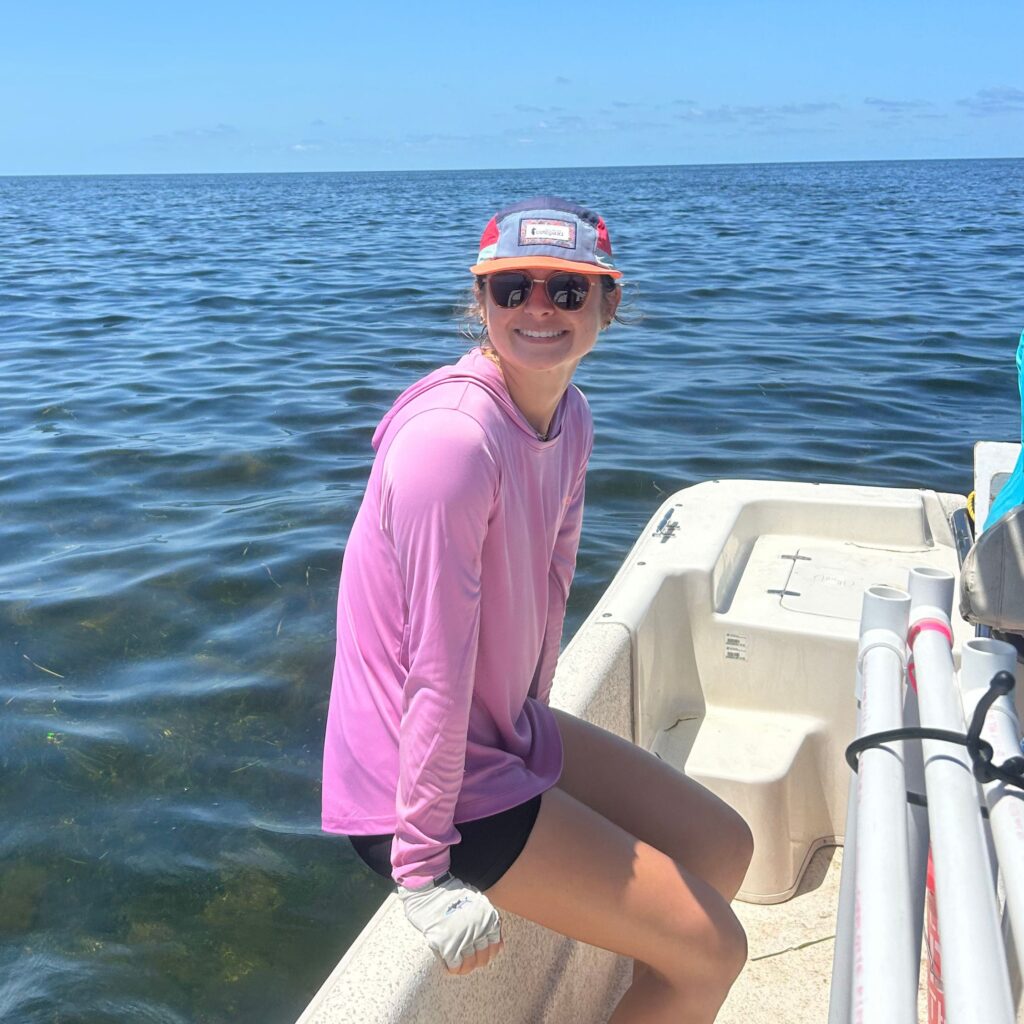
Celeste Schreiber
University of Florida, 2026
Faculty Mentor: Laura Reynolds, UF/IFAS Soil, Water & Ecosystem Sciences
Research Project: Comparing the impacts of natural and human disturbances in seagrass meadows
Celeste is majoring in marine science with a minor in agricultural and natural resource ethics and policy at the University of Florida. Celeste recently became interested in exploring social-ecological connections through the field of coastal ecology with the hopes of pursuing a career in marine policy. This summer she is working in the Reynolds Coastal and Marine Ecology Lab alongside her faculty mentor, Dr. Laura Reynolds, an Associate Professor of Coastal Ecology in Soil, Water, and Ecosystem Sciences. Their project is part of a broader research initiative examining the ecological impacts of human disturbances, specifically boat propeller scars, on seagrass ecosystems in the Gulf of America. The intern will focus on comparing these anthropogenic disturbances to natural ones, such as stingray pits, manatee trails, and stone crab burrows. Celeste’s fieldwork involves snorkeling, trawling, and sediment sampling, with opportunities to contribute to mapping, outreach, and stakeholder engagement.
What is Celeste most looking forward to?
“I look forward to learning more about Florida’s Nature Coast and connecting with local communities through this internship!”
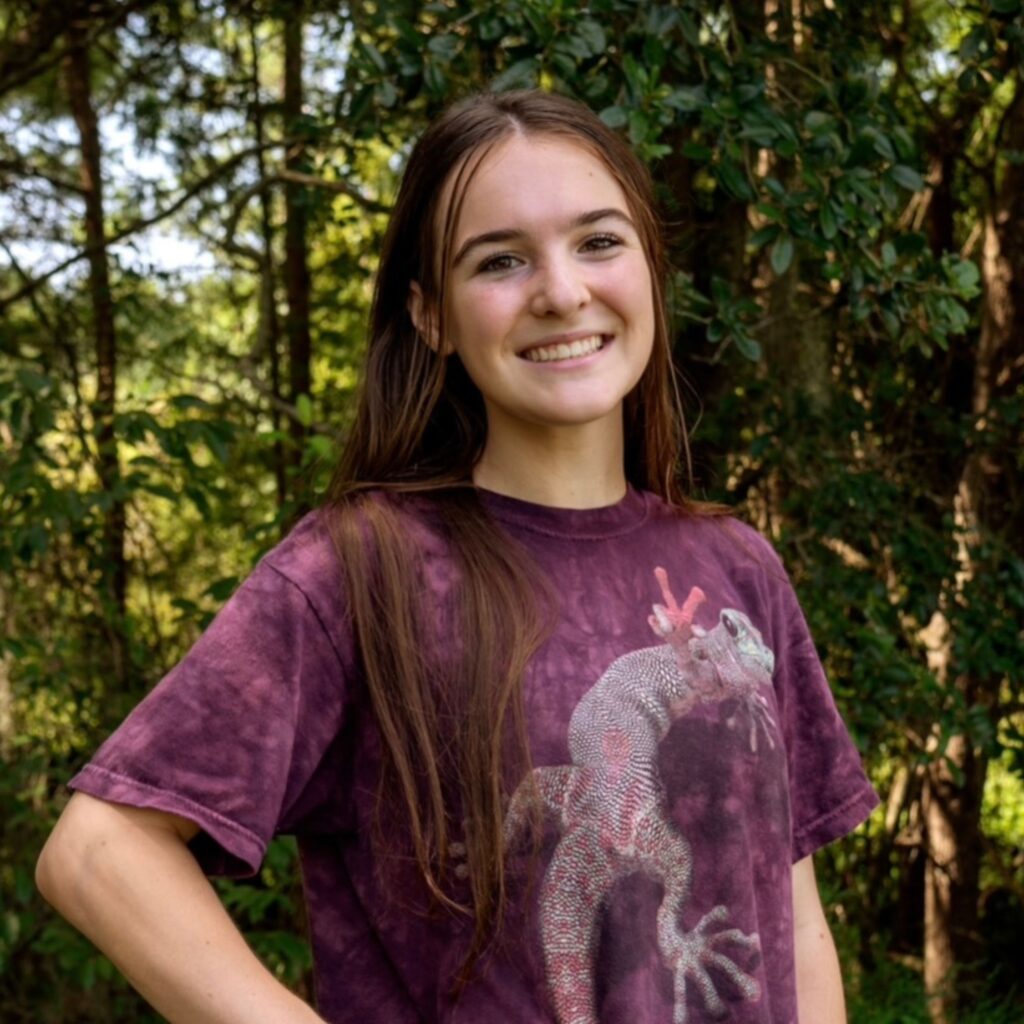
Isabella “Bella” Scramoncin
University of Florida, 2026
Faculty Mentor: Thomas Anderson, UF/IFAS Food and Resource Economics
Research Project: Restoring value to marine ecosystems through restoration aquaculture
Bella is a Food and Resource Economics major at the University of Florida. This summer she is paired with faculty mentor, Dr. Thomas Anderson, an Assistant Professor researching design and evaluation of natural resource policy in the Food and Resource Economics Department. Isabella’s internship project explores the emerging role of restoration aquaculture in enhancing natural capital and ecosystem services in Florida’s marine environments, with a focus on its economic implications. She will work with Dr. Anderson to develop a framework that links restoration efforts to benefits for multiple marine user groups. Bella was drawn to this internship because of past work in restorative aquaculture practices and found herself seeking more hands-on experience in the field of aquaculture.
What is Bella most looking forward to?
“I am eager to explore the economic implications of restoration aquaculture and have the opportunity to work alongside faculty at the University of Florida to broaden my knowledge on the field of aquaculture as a whole.”
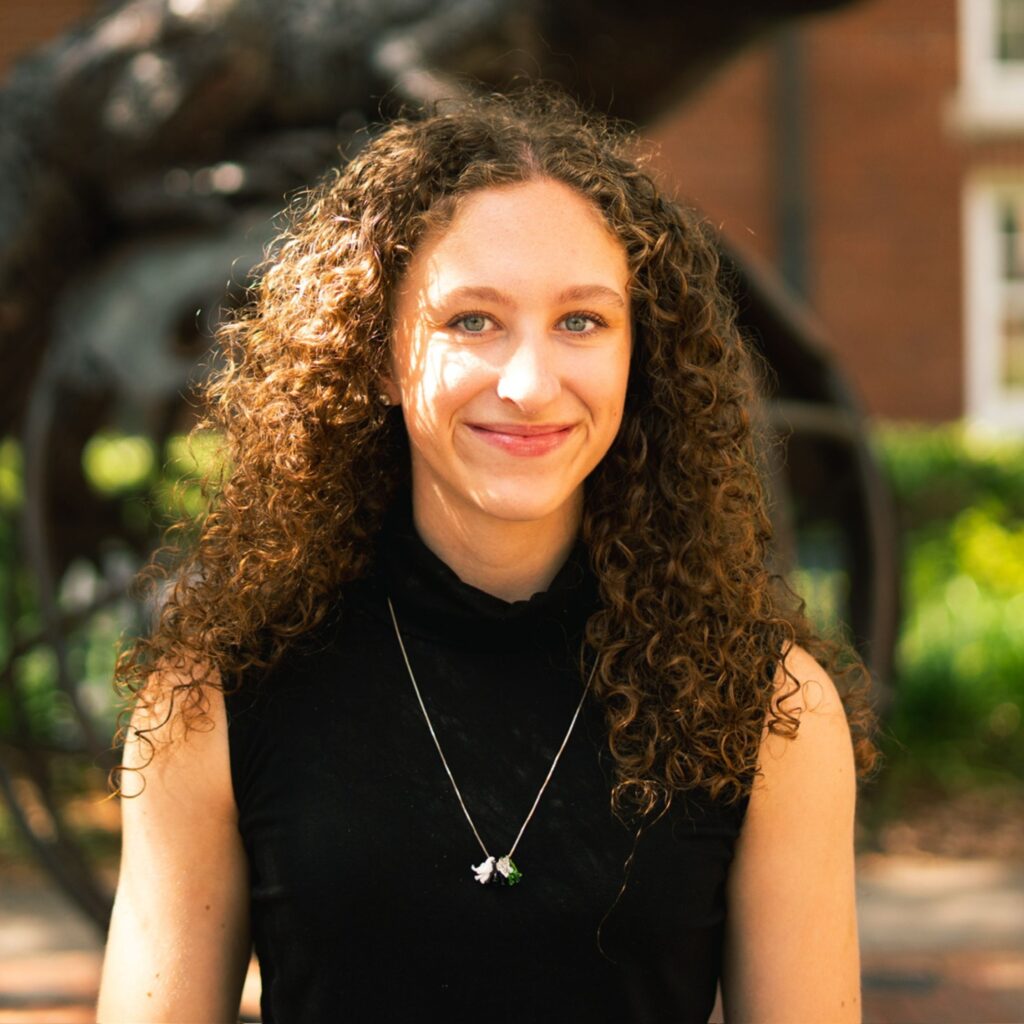
Grace Russo
University of Florida, 2027
Faculty Mentor: Donald Behringer, UF/IFAS School of Forest, Fisheries & Geomatics Sciences
Research Project: Informing sponge restoration/enhancement ecology to achieve hard-bottom community conservation goals
Grace, a student at the University of Florida majoring in Microbiology and Cell Science will be working this summer in the Behringer Lab. Grace has a strong interest in human virology and infectious disease and was drawn to this internship because of the intersection between microbiology and marine science. Her faculty mentor, Dr. Donald Behringer, is a Professor of Marine and Disease Ecology in the School of Forest, Fisheries, and Geomatics Sciences. Together they work on a project investigating how different ecological factors, such as sponge density, spatial arrangement, and elevation, influence the success of sponge restoration and the ecological functions they support in Florida’s coastal habitats. Grace will contribute to field experiments assessing sponge growth, survival, and associated community biodiversity, outcomes of which will generate insights that inform best practices for restoring these ecologically important organisms.
What is Grace most looking forward to?
“I’m most looking forward to gaining hands-on experience with molecular techniques in a real-world research setting and seeing how microbiology contributes to aquatic health. I’m excited to learn more about how my skills can be applied across different fields of science.”
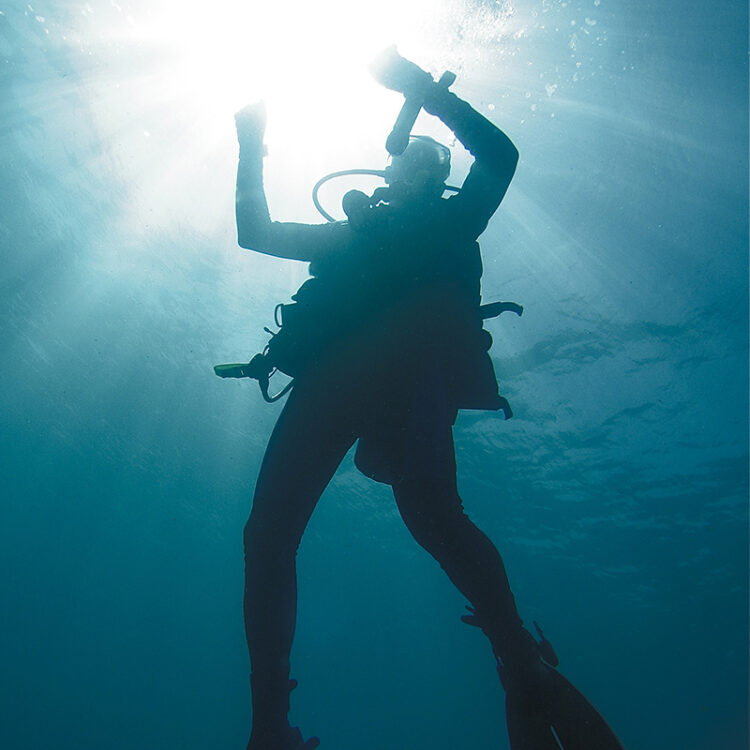
Janus Ferrell
University of Florida, 2028
Faculty Mentor: Huiping Yang, UF/IFAS School of Forest, Fisheries & Geomatics Sciences
Research Project: Field evaluation of F1 performance from a low-salinity hard clam breeding
Janus is a Marine Sciences major at the University of Florida completing his research internship alongside faculty mentor, Dr. Huiping Yang, an Associate Professor of Molluscan Shellfish Aquaculture and Restoration in the School of Forest, Fisheries, and Geomatics Sciences. Janus’s research project will focus on evaluating the growth and survival of hard clam offspring bred for improved tolerance to low salinity, an urgent need for Florida’s aquaculture industry. The results will support ongoing efforts to develop more resilient clam stocks and improve seed production practices for growers facing environmental challenges. Janus hopes to apply his interest in aquaculture system maintenance in the field of fish farming in the future.
What is Janus most looking forward to?
“I’m hoping to get more hands-on experience with aquaculture system maintenance (ie plumbing, water quality control, feeding, system setup).”
As this talented cohort embarks on their summer research, we eagerly anticipate the fresh insights and contributions they will bring to critical marine and coastal issues. Their work underscores Florida Sea Grant’s commitment to cultivating the next generation of scientific leaders and advancing knowledge for a healthier environment and stronger communities. Stay tuned for updates on their discoveries and experiences throughout their scientific journeys this summer.
About Florida Sea Grant
Hosted at the University of Florida (UF), the Florida Sea Grant College Program supports research, education and Extension to enhance coastal resources and economic opportunities through a partnership with the National Oceanic and Atmospheric Administration, the State University System of Florida, and UF/IFAS Extension in counties statewide. flseagrant.org | @FloridaSeaGrant
Florida Sea Grant Student Opportunities
If you’re an undergraduate or graduate student interested in working with Florida Sea Grant, check out our FSG Student Opportunities site, social media pages, or reach out to our FSG Student Programs Coordinator ([email protected])